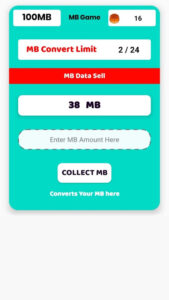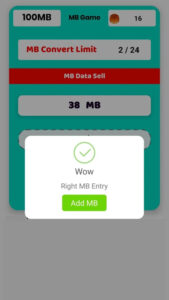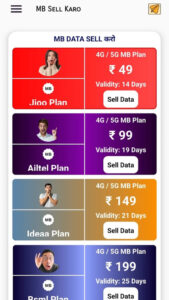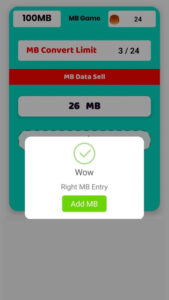4G 5G Data Sell
Tech Nice
Jun 17, 2023
August 25, 2025
13.91 MB
8.0
Android 6.0
500,000+
Description
Exploring 4G and 5G Data Selling Simulation Game on Android
4g-5g data sell apk is a simulator app for Android that lets users pretend to sell their leftover mobile data in exchange for virtual rewards points or simulated, virtual cash. Every time I see an ad-supported app that promises real data monetization or lets you practice data selling for play money, I get curious and, honestly, a little skeptical. This simulation game draws people in by suggesting easy ways to profit from every unused megabyte, practically targeting those eager to maximize their mobile data balance. It functions like a game, yet it firmly remains a digital simulator, giving you the sense of running a tiny, pretend mobile data business with just a few taps.
There’s something approachable about a simulator app that stays simple. You punch in the size of your data bundle, pick your mobile operator, and with a few taps, simulate a data selling transaction, racking up virtual rewards on-screen. The twist no real money is involved, and no actual data transfers occur. Behind the curtain is only a steady stream of ads and, occasionally, a burst of hope. Especially in regions where 4G or 5G mobile data is expensive or hard to manage, it’s easy to see why the idea of data monetization holds appeal though the experience can walk the line between idle entertainment and mild frustration. As we dive deeper, the details good, bad, and confusing begin to emerge.
Key Simulator App Mechanics for Mobile Data Monetization via APK
Simulator Mechanics
The main feature of the 4g-5g data sell apk is its simulation engine. This is the core of the entire simulation game experience. Users like me, during a late-night experiment input their mobile data balance. The interface then asks you to select your mobile operator and enter the amount of mobile data you have remaining. With a quick tap, the simulator “sells” your imaginary data, instantly awarding you virtual cash.
- First, users enter their 4G or 5G mobile data balance.
- Next, they select a supported mobile operator from a menu.
- The simulation “sells” the input data and displays virtual earnings.
- The app uses animations and notifications to mimic transactions, though nothing tangible occurs.
- Most steps require ad views to proceed, with completion gates often after watching ads.
It may initially feel like a gamified finance tool, but without real stakes except perhaps your patience and battery drain. The core loop is about watching ads for progress with virtual rewards instead of actual payouts, making this a quintessential ad-supported app.
Supported Operators and Compatibility
Selecting your mobile operator in the simulator looks important, but the choice is, ultimately, only cosmetic. The APK claims to support various carriers local and international.
- Supported operators span major and minor carriers.
- Switching operators changes logos and simulated payout screens, with negligible impact on outcomes.
- Compatibility is broad: Most Android devices and versions are supported.
However, users often report failed sales, regardless of chosen carrier. This exposes that there’s no actual backend network process the entire data selling activity is simulated. While this maintains universality, it lessens any sense of realism you might expect from a true utility.
User Onboarding and Mobile Operator Experience in the Data Selling APK
Setup Process
The initial setup will be familiar if you’ve encountered other simulator apps or reward APKs. You install the APK, launch it, and begin user onboarding processes.
- Upon opening, the app requests various app permissions, often including access to location data, contacts, phone status, and sometimes storage.
- Before reaching the main simulator game screen, you’re likely to view ads.
- Users typically describe onboarding as brisk but intrusive.
The possibility of turning virtual data into digital rewards is compelling and gets you started. But the barrage of app permissions and location tracking requests before you even begin can be off-putting.
Navigation and Workflow
Interface navigation is simple. Menus are basic, focusing on function over form.
- The typical workflow: enter data, pick your mobile operator, and run the simulation.
- Each major action often triggers an ad view or pop-up.
- Alerts and prompts can interrupt the session, especially before displaying virtual earnings.
The steps are straightforward, though frequent ad interruptions disrupt the flow. Early sessions feel smooth until every action demands a new advertisement or introduces delays.
Virtual Rewards and Withdrawal System in Android Data Selling Apps
Virtual Points and Withdrawal
On paper, the reward system is clear: participate in simulated data selling, earn virtual points. These virtual rewards accumulate in your app balance.
- Every simulated sale increases your virtual rewards.
- There’s a minimum threshold for withdrawal, visible in your account summary.
- Once the threshold is reached, a withdrawal system prompt appears.
However, reaching actual withdrawal is a different story. Virtual cash or points almost never convert outside the simulator. Users encounter endless “processing” screens and repeated ad prompts, making the withdrawal system feel more like a loop than a functional feature.
Barriers to Earning
Several hurdles impede progress in “earning” these rewards.
- Withdrawal systems stall with constant confirmations and ad gates.
- Some report progress resets, losing hard-earned virtual points.
- Others find maximum virtual rewards capped, stopping further accumulation.
- Each simulation may contribute to additional battery drain and data use, adding subtle costs.
As barriers add up, the initial excitement of virtual rewards fades, turning the process into routine rather than a route to gain.
Online Requirement and Automation Consistency in 4G-5G Simulator Apps
Automation Consistency
A theoretical attraction of the simulator app is automation: the APK calculates data balance and handles simulated sales autonomously. In reality, results vary.
- Sometimes, automated steps cannot recognize inputs, requiring manual intervention.
- Frequent crashes occur during ad-heavy sections or rapid navigation.
- Automated accumulation of virtual points rarely works as seamlessly as expected.
These issues make reliability a challenge. For example, fast switching between screens or attempted back-to-back simulations often results in lost progress.
Sync and Connectivity
This ad-supported app imposes a constant online requirement; internet access is a must, particularly since ad viewing fuels every reward cycle.
- No true offline mode is provided.
- Progress doesn’t reliably sync across different logins or devices.
- Lost virtual rewards due to poor syncing are a common complaint.
Even with strong connectivity, the app sometimes lags or fails to reload session data. There’s no centralized tracking of points you’re limited to what’s stored locally, impacting both reliability and data privacy.
App Permissions, Data Privacy, and Location Tracking in Ad-Supported Apps
Permission Requests
At startup, the APK requests more app permissions than expected from a simple simulator app.
- Requests for location tracking and device status are standard.
- Occasionally, access to contacts and storage is sought.
- Many users decline unnecessary permissions to protect data privacy.
These requests seem excessive given that the app is only a simulation game with no real data selling. Over-permissiveness raises natural concerns around user data privacy.
Data Usage and Security Concerns
As an ad-supported app, this APK collects some user information to optimize ad delivery.
- The simulator consumes significant mobile data due to persistent ad streaming.
- Extensive background activity often leads to noticeable battery drain.
- Users express concern over information collection, particularly with location tracking and device inventory needs.
User reviews frequently mention intrusive ad tracking and security concerns. Although widespread critical incidents are not reported, the combination of extensive app permissions and data usage can make the novelty of virtual rewards seem less appealing.
User Feedback, Battery Drain, and Data Selling Tips for Android Simulator Apps
Suggested Usage Tactics
Should you still wish to experiment, some user-circulated tactics might help:
- Limit app permissions upon first use to minimize data privacy risks.
- Stick to brief sessions to reduce battery drain and mobile data usage.
- Dismiss ads quickly or try menu navigation to occasionally skip them.
- Read disclaimers upfront to temper your expectations about actual rewards.
These approaches may lower frustration, but none have unlocked real-world payouts or substantial long-term rewards.
Common User Concerns
Most user feedback focuses on skepticism. Frequent issues include:
- Difficulty with the withdrawal system actual conversion of points is nearly impossible.
- The app requests far more app permissions than required.
- Battery drain and data use ramp up due to the online requirement and sustained ad viewing.
- Limits on virtual progress and unexpected resets frustrate users.
For most, this simulator app entertains only briefly, with the quirks being more intriguing than the rewards.
Final Thoughts: Virtual Cash and Data Monetization Value in 4G-5G APKs
4g-5g data sell apk is an Android simulator app that invites users to experience pretend data selling for virtual rewards. Its promise of easy data monetization and a fun simulation game entices users to enter their 4G or 5G data balance, select a mobile operator, and chase simulated payouts. Yet, the app’s core loop is built around watching ads; the withdrawal system never delivers real results, and automation features are inconsistent.
Frequent app permissions requests, ongoing location tracking, battery drain, and notable data privacy issues all dampen the experience. Most rewards remain entirely virtual, leaving no impact on your actual finances or mobile data plan. Overall, this ad-supported app works best as a short-term digital curiosity rather than a true financial tool for mobile data sales or management. If you’re tempted, prioritize your data privacy, minimize permissions, and enjoy the simulation game for what it is a brief diversion, not a real-world solution.
Images











